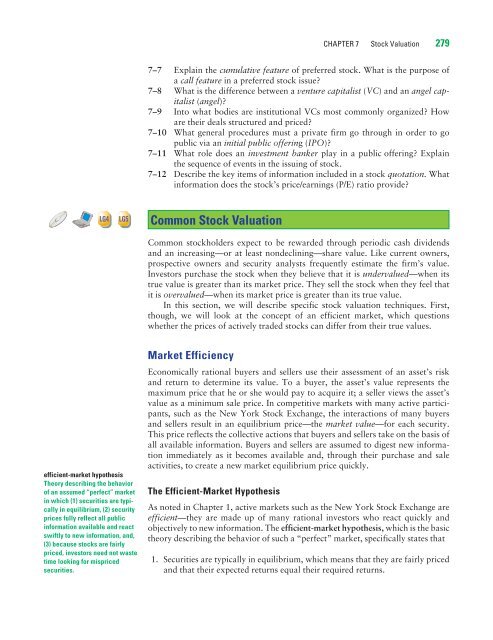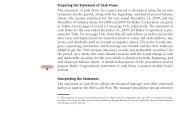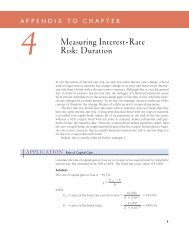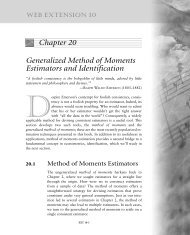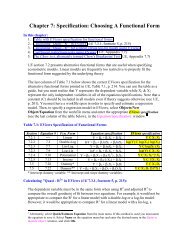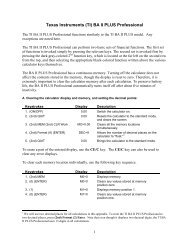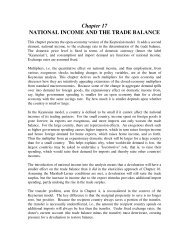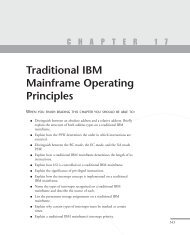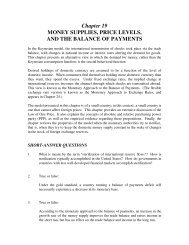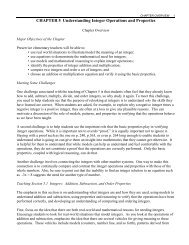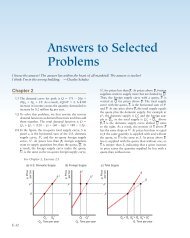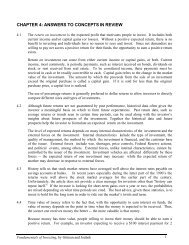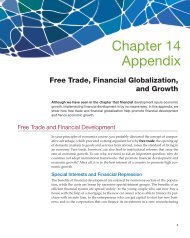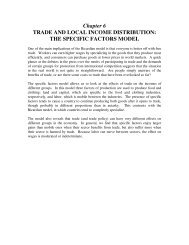Stock Valuation
Stock Valuation
Stock Valuation
You also want an ePaper? Increase the reach of your titles
YUMPU automatically turns print PDFs into web optimized ePapers that Google loves.
LG4 LG5<br />
efficient-market hypothesis<br />
Theory describing the behavior<br />
of an assumed “perfect” market<br />
in which (1) securities are typically<br />
in equilibrium, (2) security<br />
prices fully reflect all public<br />
information available and react<br />
swiftly to new information, and,<br />
(3) because stocks are fairly<br />
priced, investors need not waste<br />
time looking for mispriced<br />
securities.<br />
CHAPTER 7 <strong>Stock</strong> <strong>Valuation</strong> 279<br />
7–7 Explain the cumulative feature of preferred stock. What is the purpose of<br />
a call feature in a preferred stock issue?<br />
7–8 What is the difference between a venture capitalist (VC) and an angel capitalist<br />
(angel)?<br />
7–9 Into what bodies are institutional VCs most commonly organized? How<br />
are their deals structured and priced?<br />
7–10 What general procedures must a private firm go through in order to go<br />
public via an initial public offering (IPO)?<br />
7–11 What role does an investment banker play in a public offering? Explain<br />
the sequence of events in the issuing of stock.<br />
7–12 Describe the key items of information included in a stock quotation. What<br />
information does the stock’s price/earnings (P/E) ratio provide?<br />
Common <strong>Stock</strong> <strong>Valuation</strong><br />
Common stockholders expect to be rewarded through periodic cash dividends<br />
and an increasing—or at least nondeclining—share value. Like current owners,<br />
prospective owners and security analysts frequently estimate the firm’s value.<br />
Investors purchase the stock when they believe that it is undervalued—when its<br />
true value is greater than its market price. They sell the stock when they feel that<br />
it is overvalued—when its market price is greater than its true value.<br />
In this section, we will describe specific stock valuation techniques. First,<br />
though, we will look at the concept of an efficient market, which questions<br />
whether the prices of actively traded stocks can differ from their true values.<br />
Market Efficiency<br />
Economically rational buyers and sellers use their assessment of an asset’s risk<br />
and return to determine its value. To a buyer, the asset’s value represents the<br />
maximum price that he or she would pay to acquire it; a seller views the asset’s<br />
value as a minimum sale price. In competitive markets with many active participants,<br />
such as the New York <strong>Stock</strong> Exchange, the interactions of many buyers<br />
and sellers result in an equilibrium price—the market value—for each security.<br />
This price reflects the collective actions that buyers and sellers take on the basis of<br />
all available information. Buyers and sellers are assumed to digest new information<br />
immediately as it becomes available and, through their purchase and sale<br />
activities, to create a new market equilibrium price quickly.<br />
The Efficient-Market Hypothesis<br />
As noted in Chapter 1, active markets such as the New York <strong>Stock</strong> Exchange are<br />
efficient—they are made up of many rational investors who react quickly and<br />
objectively to new information. The efficient-market hypothesis, which is the basic<br />
theory describing the behavior of such a “perfect” market, specifically states that<br />
1. Securities are typically in equilibrium, which means that they are fairly priced<br />
and that their expected returns equal their required returns.


